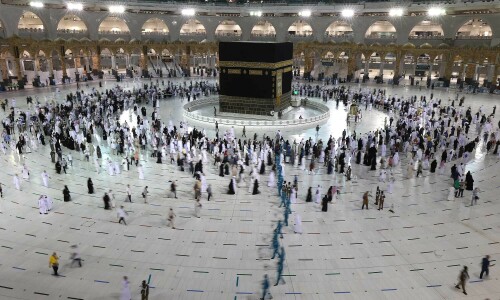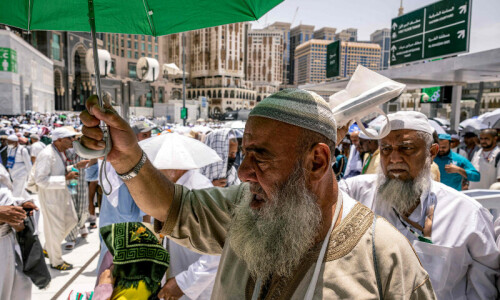A total of 179,210 Pakistani pilgrims will perform Haj in 2025, Minister for Religious Affairs and Interfaith Harmony Chaudhry Salik Hussain announced while unveiling the Haj Policy 2025 in Islamabad on Monday.
Haj, one of the fundamental pillars of Islam, is performed each year by millions of Muslims worldwide. Pakistan receives one of the highest Haj quotas from Saudi Arabia.
While announcing the new policy, the minister said the “Haj quota has been divided with a ratio of 50-50 between the government and private Haj schemes,” according to state-run Radio Pakistan.
The minister said 89,605 seats each have been reserved for the government and the private Haj schemes, respectively.
He added that 5,000 seats will be kept for sponsorship under the government Haj scheme, while 30,000 seats will be allocated to private Haj tour operators for sponsorship.
Hussain highlighted that it was mandatory to send foreign exchange via a banking channel to participate in the sponsorship scheme.
He clarified that the government sponsorship scheme will operate on a “first come, first served” basis and will be exempted from balloting. He also noted that foreign exchange collected through the sponsorship scheme will be used solely for Haj-related expenses in Saudi Arabia.
Under the Government Haj Scheme, the traditional long stay will be of 38 to 42 days, and the short stay will be 20 to 25 days. Each organised private Haj group must consist of at least 2,000 pilgrims as per Saudi regulations, the minister said.
The cost for the government scheme is expected to range between Rs1,075,000 to Rs1,175,000, while additional cost for the sacrifice will be Rs55,000.
Applicants opting for double-bed and triple-bed accommodations in Makkah will need to deposit an additional amount of Rs75,000 and 220,000 respectively, Hussain said.
The instalment of Haj dues, amounting to Rs200,000 must be deposited along with the Haj application under the Government Hajj Scheme, while the second instalment of Rs400,000 must be deposited within 10 days of balloting. The remaining amount must be deposited by February 10.
Hussain noted that there would be no deduction for refunds if an application is withdrawn before the last date of submission. However, there will be a deduction of Rs50,000 on a refund of the first instalment after the balloting. A deduction of Rs200,000 will be made if the third instalment is not deposited.
No refund will be made after February 10. However, in case of the applicant’s death, the aforementioned deductions will not be applied, he said.
Haj applications will be received from November 18 to December 3, while balloting will be held on Dec 6.















































Dear visitor, the comments section is undergoing an overhaul and will return soon.